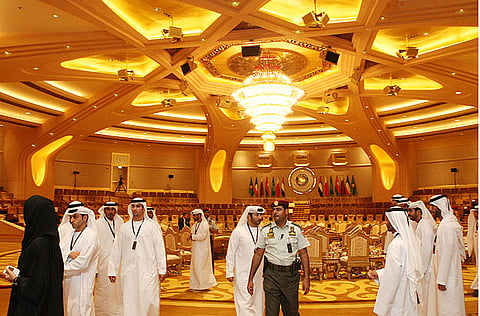Stance on monetary union won't change: official
Unprecedented security at GCC summit in Abu Dhabi; Governor of UAE Central Bank confirms UAE has no plans to go ahead with GCC monetary union

Abu Dhabi: The Gulf Monetary Union will not see any progress during the GCC summit as the UAE, which has pulled out of the agreement last year, says now is not the proper time to change its position, a top official said on Monday.
The comments came as journalists reported tight security to Emirates Palace in the UAE capital to attend the GCC summit.
Veteran journalists who have covered past GCC summits told Gulf News they were surprised by the strict security measures such as multiple check points and constant supervision and monitoring by security agents.
Meanwhile, at press conference prior to the opening of the summit, Sultan Bin Nasser Al Suwaidi, Governor of the UAE Central Bank, confirmed that the UAE has no plans to go ahead with the GCC monetary union during the summit.
"We don’t think it is the proper time to discuss the UAE going back to the project of the single GCC currency."
"We wish all the best to all GCC countries that have already agreed to join the monetary union. We should be more cautious and patient before going ahead with the union. The project is in an advance stage that needs accurate planning,” Al Suwaidi said.
According to him, the monetary union is far from single currency: "Unified economic conditions across GCC countries are very important before moving into a single currency."
Moreover, Al Suwaidi said they will not depeg the dirham from the dollar.
"Dirham is pegged to the dollar as up to 70 per cent of our foreign trade is in dollar as well as majority of UAE investments are done in dollar."
On the other hand, Al Suwaidi ramarked that Yen and Euro are the main alternative currencies for the UAE. "However, US dollar is the best option to promote our business interests."
The six members of the Gulf Cooperation Council (GCC) - Bahrain, Kuwait, Oman, Qatar, Saudi Arabia and the UAE - planned to introduce a single currency by 2010 and several steps have already been taken.
However, the past year has been marked by doubts over the project and its scheduled deadline.
The UAE last year announced its withdrawal from the monetary union due to disagreement over the location of the future Gulf Central Bank. The process has since been delayed.
Saudi Arabia claimed that it would host the Central Bank for which the UAE had already bid. The withdrawal of the UAE — the region's trade gateway — from the monetary union was the biggest setback the group had faced since its formation nearly three decades ago.
Oman had earlier pulled out of the plan. However, Bahrain, Kuwait, Saudi Arabia and Qatar have remained committed to it.
In 2007, Kuwait cut its currency loose from the US dollar, preferring to float its dinar against a basket of currencies. The Kuwaiti move put it at odds with the other Gulf states, which peg their currencies to the dollar.
"The UAE economy is in a better shape and we are far from the crisis and the banking sector is to continuing in growth but not as high as it witnessed before," Al Suwaidi said.
"Confidence in the UAE economy and banking sector has tremendously increased."
Assuring the health of UAE’s banking sector, he said that the total assets of UAE banks is Dh1.6 trillion, which is slightly bigger than Turkey but the highest in the Arab world.
With inputs from Layelle Saad, GCC & Middle East Editor
Sign up for the Daily Briefing
Get the latest news and updates straight to your inbox

